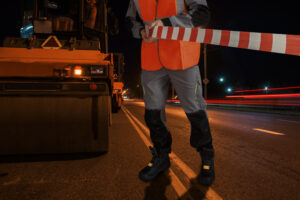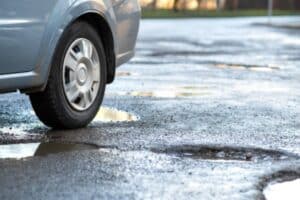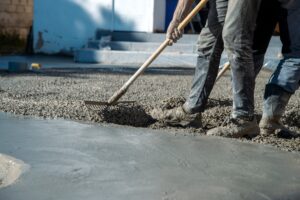Sealcoating is a crucial step in asphalt maintenance, providing a protective layer that shields the asphalt from harmful elements like UV rays, oil, and chemicals. By applying a high-quality sealer, you’re helping to extend the life of your driveway and keeping it looking great for years. However, timing is key, especially when it comes to avoiding rain after sealing your driveway.
Rain after sealing a driveway can cause serious issues. If it rains before the sealer has fully cured, the water can wash away the newly applied layer, leaving patches of unprotected asphalt. This not only impacts the appearance but also leaves the surface vulnerable to water damage, which can lead to accelerated deterioration, such as cracking, potholes, and erosion. In this article, we’ll cover some of the most frequently asked questions about rain after sealing a driveway, from ideal drying times to steps you can take if rain does occur.
Sealcoating Asphalt and Rain
Sealcoating and rain don’t mix well. For sealant to work effectively, it must dry and cure completely before being exposed to moisture. Applying sealcoat in wet conditions or during rainy weather can compromise the final result, which is why most professional sealcoating jobs are scheduled between late spring and early fall when the weather is generally dry and warm.
Why Timing Matters
If it rains before the sealant has fully dried, the moisture can interfere with the curing process. This often leads to poor adhesion, resulting in a streaky, uneven, or blotchy appearance. Even worse, heavy rain can wash away the sealant altogether if it hasn’t had time to bond properly with the surface.
Rain Before Sealing Driveway
If sealcoating must be done shortly after it rains, it’s important to allow the asphalt to dry completely before applying any sealant. This means waiting until the pavement is free of moisture—not just on the surface, but also below. Applying sealant to a damp driveway can prevent it from sticking, causing premature wear and wasted material.
Rainy or Humid Conditions
Sealcoating should also be avoided during foggy or overly humid conditions, as these slow down the drying process. Ideally, sealant should be applied when the forecast calls for at least 24 to 48 hours of dry weather to ensure proper curing. Without adequate drying time, the protective benefits of the sealcoat are significantly reduced.
How to Prepare for Sealcoating in Wet Weather
If you must apply sealcoat in a wet season, there are a few things you can do to guarantee that the sealant adheres and cures effectively:
- The surface should be cleaned of all dirt, dust, and debris before applying sealcoating. This will help the sealant adhere to the coating better.
- Consider adding a coat of special primer to the driveway. The primer helps create a stronger bond between the sealer and the pavement to sealcoat in wet weather.
- Keep driveways covered if possible. Moving cars and other objects away from the area will prevent sealcoat from being washed off prematurely.
- If an item cannot be moved, cover it with plastic or tarps to protect driveway sealant application — wait until dry weather returns before removing covering material.
- If driveway sealcoating or parking lot sealing must be done, wait until the rain stops, and the asphalt is completely dry before beginning.
- Ensure the sealant has completely dried before allowing cars to drive over it, as their weight may prevent the sealcoat from being applied evenly.
When sealcoating and rain are unavoidable, always use a sealant with an extended sealcoat cure time of at least 24 hours before applying water to the seal coated surface. This allows enough time for any solvents used in the sealant to evaporate and will help the sealant adhere better.
How long does sealer need to dry before the rain?
If it is expected that rain will fall within 24 hours after application, do not apply. Instead, for at least 12 hours, keep newly sealed asphalt dry.
Read more: Seasonal Asphalt Parking Lot Maintenance Guidelines
What If It Rains After Sealcoating Your Driveway?
If it begins to rain after sealcoating your driveway, it’s important to avoid driving on the surface until the rain has completely stopped. This precaution is necessary because the presence of water can interfere with the curing process of the sealant, potentially causing it to come off prematurely. By waiting for the rain to stop and the driveway to dry, you ensure that the sealant adheres properly and remains effective for a longer duration.
Driving on an unsealed driveway in the rain will cause the water to seep into asphalt paving, weakening, and degrading the asphalt. It is important to keep this from happening as much as possible to extend the life of your driveway.
In cases where sealer has already been washed away by rain, homeowners can reapply sealer but should wait for a dry day before doing so.
What to Do if it Rains After Sealcoating Your Driveway
Don’t worry about rain damage until you notice the wet weather results. Wait until the rain stops before looking at your driveway. Then check it out.
If your driveway has dull areas mixed with glossier ones, some of your sealant has been washed away. In this instance, simply reseal those dull sections when the weather permits. However, if the rain-induced damage is significant enough, you may have to restore the entire driveway.
It is also important that sealants do not encounter metal objects such as lawn furniture, which will leave permanent stains on the coating if they are left out too long while wet. These stains cannot be removed once the sealcoating cures fully, so it is best to move these items away from your driveway until all rain has stopped and dried up.
Rain Damage Over Time
Even after a sealcoat has fully dried, frequent exposure to moisture can still affect the surface over time. Rainwater, especially in areas with micro-cracks or slight imperfections, can seep through, weakening the underlying asphalt. This moisture buildup can lead to the formation of cracks or even potholes as the water erodes the foundation beneath the surface. Sealcoating is meant to protect against this, but areas with repeated exposure to rain may require more frequent inspection and maintenance to make sure the coating remains intact.
Sealcoating and Rain FAQs
How long does asphalt coating need to dry before the rain?
It must dry for at least 24 hours before rain, ideally 48.
Any moisture remaining on your asphalt driveway can convert to steam when exposed to water or heat, such as a hot exhaust pipe if it is not allowed to dry properly ahead of time. This is known as spalling, which results in pock-mark depressions on the surface of an asphalt driveway.
How soon can new asphalt driveway or parking lot get wet?
Fresh asphalt can get wet 24 hours after being paved. However, two to three days is ideal.
What sealer should be used for driveway sealcoating?
Most sealers are acrylic or asphalt-based and can seal any surface. However, some sealers may not work well with your existing paint job if it is latex-type material. It will also depend on how much traffic you expect the sealed surface to handle.
Can driveway paving sealant be applied when it is raining?
No. Sealcoat should not be applied if there are any signs of rain.
Read more: The Complete Guide to Sealcoating For Property Managers and HOAS
If you need a professional to see whether your sealcoat needs replacement, contact Superior Asphalt, LC.
Decision-makers who need advice on sealcoating and rain can rest assured knowing that they have a solution to their problem. By simply sealcoating during non-rainy weather, homeowners and businesses can avoid issues with the sealant running off prematurely.
If you need Utah sealcoating, asphalt repair, or have any other questions, please do not hesitate to contact Superior Asphalt, LC. We are your local Utah asphalt maintenance professionals!




